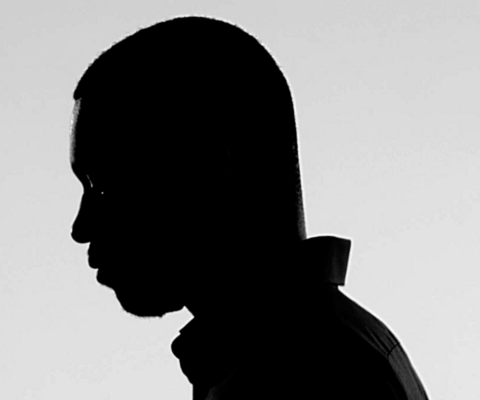Ephesian is a little different. He’s new to the program. He’s only been around a couple weeks. He’s so fresh out of prison the trauma of it haunts him. You can hear it in his voice.
So what is that trauma like? What is a day in prison? What gets you locked up, and what brings you to the street life in the first place?
We’re going to dive into those questions through Ephesian’s eyes as he takes his new – 100% crime-free – life day by day. It’s a hard life to look at, but a necessary one, too. There’s so much to learn in every man’s story. This is Ephesian’s.
Ephesian preferred that we did not post his photo with his story – the silhouette of the man above is meant to be representative of his story.
* * * *
“I feel unsure,” says Ephesian early in the conversation. He’s only been out of prison a couple months. “I don’t know why I’m here and where I’m going to end up. I told myself this was my last run. I can’t do time anymore. I miss out on too much.”
Ephesian is a father. His two youngest children were still babies when he caught a charge that sent him to prison for 10 years and 10 months. Though their mother brought them to see Ephesian for the first few years, it became too much for her. “She was having a hard time finding her footing,” he says. “She felt like the only way for her to move forward was to cut me loose.” For four years, he didn’t hear from her at all. “I thought about them every day. I’d wonder how she’s doing, how the kids are doing. It was a lot of writing letters with no response back. Calling her phone, but the phone number changed. Emailing her, but getting no response. I didn’t even know if she was still in the same state.”
Being cut off from his children added to the strain of prison. “That shit,” he says, “was terrible.”
“You have to depend on people to support you,” he says. “They have to put money in your account, if you want to buy things. But anytime they send you something, it takes away from their responsibilities.” The guilt of depending on others was overwhelming, as was the frustration of prison itself.
“Every day is like Groundhog Day,” he says. “Same shit every day. You wake up, throw clothes on, go to work (I worked HVAC for facilities), get off work, shower, go outside, walk the tracks, go into my room, workout, shower again, watch TV.” Repeat, ad nauseum.
While there, he did his best to stay positive, enrolling in every class he could, learning about culinary arts and getting some construction certifications. But it’s hard to stay positive in a cell you share with a revolving cast of often-shady characters; Ephesian had 23 roommates in his 10 years. Some were okay; others…well… “One cellmate, I was praying to God, please don’t let me kill him…and then one day I was praying to God to help me kill him and get away with it. He was a gang banger, and he was a miserable dude. He hated everything and everyone. His sisters, friends, family. He was mad at the world, and it brings you down. People don’t owe you nothing. You’re in prison for what you did. You can’t get mad at them because they won’t visit you or accept your phone calls. You’ve got to tough it out, and when you get out, you’ve got to try to do something different.” Luckily, when Ephesian was at his breaking point, that particular cellmate was transferred elsewhere.
So yes. That shit [prison] is terrible. So then the question becomes: why was he there in the first place, since, generally speaking, you don’t wind up in prison for no reason.
In Ephesian’s case, it’s sort of simple. He was a drug dealer for most of his life. His first arrest came at age 15. He and some older friends were going to sell some drugs at a local crack house. When they got there, the house was already full of people, including other dealers and some prostitutes, so they headed home. Teenagers, they were, running into addicts and prostitutes as a normal part of their world. On the way that day, they were stopped by a police officer. “We got in a scuffle,” says Ephesian. “He threw me down, then told the others they better run. They all left me there on the ground.”
He was sent up to juvenile for that charge, a stay that lasted too many months, at least in his mind. There, he was locked in his room for the majority of every day. “Time slowed down in juvenile,” he says. “Some people passed the time beating on their doors, screaming, kicking, threatening each other.” There were lots of fights in those moments when the doors opened. Ephesian learned quickly there was no backing down from one. If you were challenged, you fought. End of story.
After that, Ephesian was in the lifestyle fulltime. “The lifestyle was always the same,” he says. “You get out, you sell drugs. That’s what I was taught, that’s what I was used to, that’s what I knew. I need clothes, I need shoes? Best way to get it is to sell drugs. It’s what everybody was doing. It just felt normal.”
And yet, even then, he knew something was wrong. “I used to pray every night, ‘Lord, please help me find a way to get off the streets,’” he says. His home got shot up in a drive-by, and he grew tired. “Tired of going in the streets. Tired of looking over my shoulders. Tired of not knowing if I’m going to jail or if somebody is going to rob me or kill me. Tired of worrying all the time.”
But selling drugs paid the bills.
And selling drugs was the only thing he’d ever known.
“My mom sold drugs,” he says, when asked about his childhood. It was the late 70s, early 80s, and there was always a party going on. He was his mom’s second child, and she was only 18 when Ephesian was born. Theirs was a rootless existence. “We had no stable home. We were always at this person’s house, that person’s house. One time I remember we slept in the park…my mom cried all night long.” Nothing he or his brother said made her feel better that night.
Their first stable home was in the projects. The only things they owned were a yellow pull-out couch-bed and a 13-inch black & white television. His father wasn’t in the picture. Ephesian never even heard from him until he was 17 years old, and then it was just a couple of letters, a short visit, and nothing meaningful.
When asked to share his best childhood memory, Ephesian clearly struggles. They only celebrated two Christmases that he can remember. One was with one of his mom’s husbands before he caught a 54-year sentence. The other was with his brother’s father. Ephesian got a bike that year.
But his best memory is the first time he had his own birthday cake. He was six years old and it was chocolate and lopsided, baked by his Aunt Maisie. She was so proud of the cake she made for her nephew, and while Ephesian’s brother and cousins blew out the candles, he knew cake was his. That was a good day. A chocolate, lopsided birthday cake homemade by his very own auntie made it the best.
* * * *
So where does that all leave Ephesian now?
He’s trying to break the cycle of the street lifestyle for his own children. “I was in a gang selling drugs,” he says. “I ended up with nothing every time. I got the car, the clubs, the clothes, but it always gets taken from me in the end. The people who work nine-to-five jobs always have it. They don’t ever have to look over their shoulder, looking for police.” Even something as simple as carrying an ID is new to Ephesian; he always traveled without identification in case he got pulled over and had to run.
His goals today are simple. Someday he’d like to run a nonprofit to help others, and to own his own home. “I want a good job, being able to pay my bills, being able to have my kids with me on weekends,” he says. He’s been trying to see his kids as much as possible since his release, to mend all the bridges he can. His best moment was seeing them for the first time after he got out of prison. Gone were the babies he’d left, but they were still his. “She [their mother] still told them all about me, even during the years we didn’t talk. So they knew who I was. Seeing them there, their smiles, the way the hugged me and held me. They’re people now. They can hold conversations. My son plays the trumpet. It’s a beautiful thing.” His voice is full of pride.
If he could say any one thing to them, over and over, he’d tell them, “Daddy fucked up and had to do his time. I never meant to leave you. That’s something I’d never do. I’ll never abandon you and I’ll always be here for you.”
* * * *
We’re so happy you’re with us at Turning Leaf, Ephesian. You’ve traveled a tough road to get here, and the path ahead will be full of bumps and curves, but we’re going to be with you every step of the way. We’ll always be here for you, too!
Story Captured by Leah Rhyne

